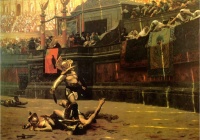Evaluation
From The Art and Popular Culture Encyclopedia

Pollice Verso (1872) by Jean-Léon Gérôme
|
Related e |
|
Featured: |
Evaluation is systematic determination of merit, worth, and significance of something or someone using criteria against a set of standards. Evaluation often is used to characterize and appraise subjects of interest in a wide range of human enterprises, including the arts, criminal justice, foundations and non-profit organizations, government, health care, and other human services.
[edit]
See also
- Immanent evaluation, opposed by Gilles Deleuze to value judgment
- Value
Unless indicated otherwise, the text in this article is either based on Wikipedia article "Evaluation" or another language Wikipedia page thereof used under the terms of the GNU Free Documentation License; or on research by Jahsonic and friends. See Art and Popular Culture's copyright notice.


